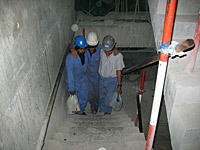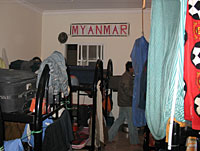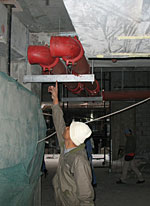




DOHA—Hundreds of Burmese laborers are being sent under contract to the Gulf state of Qatar, lured by foreign currency earnings and promises of decent jobs, living conditions, and health care.
But when they arrive, the reality is woefully different, Burmese migrant workers have said.
“The agents in Burma manipulate and cheat us,” general worker Ko Aung told RFA’s Burmese service. “All they do is squeeze from us as much as they can and then put us on the plane to Qatar. The rest is not their concern.”
Several workers echoed Ko Aung’s complaint, saying they had paid large fees to the recruitment agency for medical checkups, job search, and plane fares, and were promised specific, guaranteed jobs with sick pay, health care, and decent living conditions when they arrived in Qatar.
I don't want to stay here, but I am in debt to the agency, so I have to stay until I can pay it back.
Of Qatar’s population of 885,359, only 200,000 are citizens. The rest are foreign workers. About 900 Burmese are thought to be currently employed in Doha, most of them construction workers.
A woman working as a receptionist in a hotel in Qatar said: “I paid U.S. $300 in agent fees in Burma for a three-month contract. I have heard some people have to pay more.”
“I...have to work 12 hours a day, 7 a.m. to 7 p.m. I am lucky I got the job I was promised, but many people aren’t as lucky as I am,” she said, adding that some qualified Burmese nurses were sent to Qatar in the belief that they would work as nurses and ended up working as domestic helpers.
“They told me they have to fast during Ramadan like their employers. They want to quit and go back home, but they have to stay until their contract ends,” she said.
Tun Tun, an electrician, said he was promised an income of 800 rials (U.S.$220) a month. “But because we don’t know the local language, we are oppressed. The place we are given is very dirty, no drinking water, just water from the bathroom.”

He said his brother lives in still worse conditions, sleeping on an open roof with only a plastic sheet as protection from the rain and cold.
“But if anyone complains, he is sent back,” Tun Tun said. “Fourteen Burmese have already been sent back to Burma. If they want to send us back, they just say we failed our medical checkup, and the next day you have to leave. No compensation, no payment at all.”
“Only Burmese are facing problems here, that much hardship. Some have to change jobs five times in a month. I don’t have any job right now. Since two days [ago] I have nothing to eat, no money at all. My friends are sharing their food with me, and that’s the way I am surviving now,” he said.
“Our Burmese salary is somewhere between 600 and 1,000 rials (U.S.$275), while Filipinos get at least 1,200 rials, and Syrians and Lebanese get 3,000 rials.”
General worker Than Theik had a similar story. “I had to pay U.S.$1,600 in agents’ fees and come on a two-year contract. The agents cheat, and because we don’t understand, we pay what they ask.”

“Here again I think they are selling Burmese. They keep our passports. The highest pay a Burmese electrician gets is 800 rials, but the contractor makes 3,000 rials from his work,” he said.
“I don’t want to stay here, but I am in debt to the agency, so I have to stay until I can pay it back.”
Ko Aung called on the Burmese government to negotiate better terms for its workers, in the same way that the Philippines has done.
“We are really exploited,” he said. “Their government requires at least 1,000 rials a month plus full facilities, like only eight people in a room, washer, refrigerator, and health care.”
“If there was a regulation like that by the Burmese authorities, we would have some protection. The agent for the Filipinos comes every six months to check if they are paid properly and if they have got all the facilities and so on.”
He said the Qatari employers had already paid for the migrant laborers’ airfares, but that Burmese workers had nonetheless been duped into paying them again to the agencies.
Htay Service Co. is one major recruitment agency based in the former Burmese capital, Rangoon. A call by an RFA reporter posing as a potential worker interested in going to Qatar confirmed their line of business.
Their government requires at least 1,000 rials a month plus full facilities, like only eight people in a room, washer, refrigerator, and health care.
“The address is 42 Street, Botataung Township, Building 107, Room Number 12, on the 3rd floor. It is in the middle of the street and the sign says ‘Htay Service.’ Just come to the office and we will explain things to you,” a woman who answered the phone said. She said the company was currently recruiting workers to go to Qatar.

Asked how much a general worker could expect to earn, the woman replied: “It varies. In general they get between 40,000 and 60,000 kyat (U.S.$450 to U.S.$650). But it is not convenient to talk about agency fees over the phone. So please come to our office,” she told reporter Khin May Zaw.
“The next interview will be soon, so if you come now you won’t miss it.”
But prospective worker Mg Than had a different tale to tell.
“I just arrived 15 days ago and haven’t got a job yet,” he said. “I paid U.S.$1,450 in agent’s fees. I was told I would get paid 900 rials a month. I called my agent in Burma and told him what happened to me, and he was very angry that I called and just yelled at me for my complaint.”
No help has been forthcoming, he said. “I spent all I have with me for food and I have nothing left. The place I have to live in actually has a bare earth floor. It’s crowded, very cold at night, and the smell is unbearable.”
He had a warning for the folks back home. “If anyone from Burma wants to come to Qatar, please think carefully,” he said. “It is not as good as we thought. It’s also very cold, and be careful because employment agents and company representatives will cheat you.”
The U.S. State Department 2005 human rights report said “serious problems” remained with human rights restrictions in Qatar, with new problems emerging.
It listed: the restriction of the right of citizens to peacefully change their government; restricted freedoms of speech, press, assembly, and association; limited freedom of religion; trafficking in persons; and severely restricted worker rights.
The report said a recently enacted labor law protected some workers’ rights for citizens but forbids non-citizen workers to form unions, bargain collectively, or strike.
One Qatar-based source said that since the interviews were broadcast on RFA’s Burmese service, Htay had launched an investigation into which of its workers had spoken to RFA, saying they were “politically motivated.”
The workers were afraid of political repercussions if they were discovered and sent back to Burma, they said.
“I feel like I was sold as slave here,” Mg Than said. “We are called to stand in front of the customer. They look at our papers, our contracts, look us over from head to toe, then if they don’t like us, we don’t get the job, and there’s no payment. I really wonder if they are selling us.”
Original reporting in Burmese by Khin May Zaw. Written and produced in English by Luisetta Mudie. Edited by Sarah Jackson-Han.